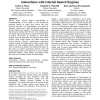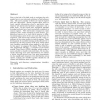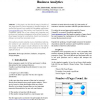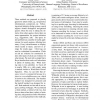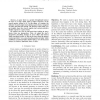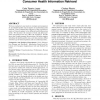124
click to vote
ICASSP
2011
IEEE
14 years 5 months ago
2011
IEEE
This paper presents a method for generating indexable and browsable keyword metadata from ASR transcripts by leveraging the Web. Search engine queries are built from an ASR transc...
118
click to vote
CORR
2011
Springer
14 years 5 months ago
2011
Springer
The correlation of the result lists provided by search engines is fundamental and it has deep and multidisciplinary ramifications. Here, we present automatic and unsupervised met...
124
click to vote
COLING
2010
14 years 9 months ago
2010
A new approach has been developed for acquiring bilingual web pages from the result pages of search engines, which is composed of two challenging tasks. The first task is to detec...
139
click to vote
CSCW
2011
ACM
14 years 9 months ago
2011
ACM
Internet search engines display understanding or misunderstanding of user intent in and through the particular batches of results they retrieve and their perceived relevance. Yet ...
164
click to vote
ADC
2010
Springer
14 years 9 months ago
2010
Springer
Due to the lack of in-built tools to navigate the web, people have to use external solutions to find information. The most popular of these are search engines and web directories....
145
click to vote
ICIW
2009
IEEE
14 years 12 months ago
2009
IEEE
Web spamming, the practice of introducing artificial text and links into web pages to affect the results of searches, has been recognized as a major problem for search engines. Bu...
129
Voted
IC
2009
14 years 12 months ago
2009
- In this paper, we describe the usage of number of web pages found by search engines for business analysis. To realize this approach we created the GoogMeter application (www.goog...
111
click to vote
EMNLP
2009
14 years 12 months ago
2009
Three methods are proposed to classify queries by intent (CQI), e.g., navigational, informational, commercial, etc. Following mixed-initiative dialog systems, search engines shoul...
113
click to vote
WEBI
2010
Springer
14 years 12 months ago
2010
Springer
A query burst is a period of heightened interest of users on a topic which yields a higher frequency of the search queries related to it. In this paper we examine the behavior of s...
116
click to vote
SIGIR
2010
ACM
14 years 12 months ago
2010
ACM
We have conducted a user study to evaluate several generalist and health-specific search engines on health information retrieval. Users evaluated the relevance of the top 30 docum...

